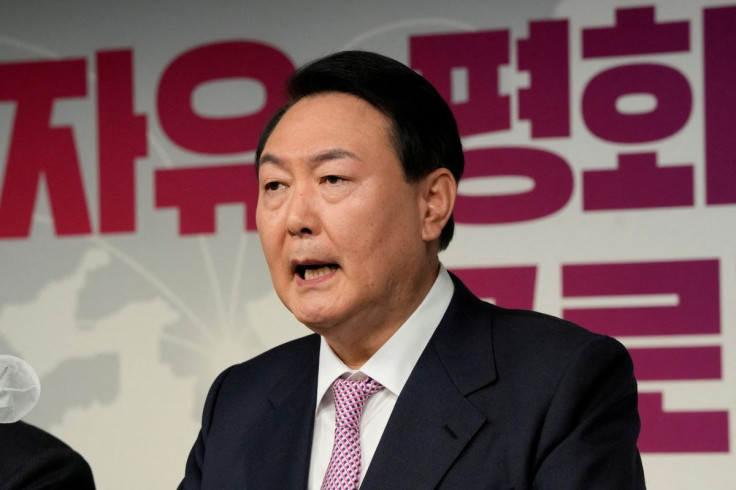S.Korea Presidential Candidate Backs Conservative, May Tip Tight Race

A South Korean presidential candidate dropped out on Thursday, throwing his support to conservative Yoon Suk-yeol in a surprise move that could tip the balance of next week's closely fought election.
Yoon, standard bearer of the People Power Party, the main opposition to the liberal governing party, was joined by fellow conservative Ahn Cheol-soo of the People Party, who had been running a distant third.
"We have no doubt that today's announcement would bring a perfect government change," Ahn, a physician and software mogul, told a news conference with Yoon, announcing the merger. "We're one team."
The shake-up days before Wednesday's election is bad news for Lee Jae-myung, representing President Moon Jae-in's Democratic Party. Moon is barred by term limits from seeking reelection.
"We can say that Yoon now has some edge, being able to fetch more ballots from centrists and moderate conservatives who had supported Ahn," said Kim Hyung-joon, a political science professor at Myongji University in Seoul.
"Of course some of them won't necessarily end up voting for Yoon, but an extra 3% to 4% could make a big difference in such a close race."
'PEOPLE'S COLLECTIVE WISDOM'
A survey by Realmeter on Wednesday, the last day for publication of polls under election rules, put Yoon ahead of Lee 46.3% to 43.1%, while an Embrain Public poll showed Yoon before the merger with less than a percentage-point lead.
Given the tight race, the swing by Ahn, whose support was around 7%, could mean a decisive conservative win, although it was unclear how many of Ahn's supporters would vote for the combined ticket.
Embrain Public estimated the merger could give Yoon 47.4% to Lee's 41.5%, while an Ipsos survey tipped the margin with Ahn at a slightly wider 48.9% to 41.9% for the conservatives. The Smarkets betting exchange gives Yoon a commanding 69%-26% lead.
Voters want a president who can clean up polarised politics and corruption, and tackle the runaway housing prices and deepening inequality that have dogged Asia's fourth-largest economy, polls show.
A former prosecutor general, Yoon has promised to stamp out corruption, foster justice and create a more level playing field, while seeking a "reset" with China and a tougher stance toward North Korea.
He wants to buy an additional U.S. missile system, a move his top foreign policy adviser has said would risk economic retaliation from China but provide a chance to improve testy diplomatic ties.
Yoon thanked Ahn, pledging to win the election and realise their shared vision for national integration through a joint government.
Lee's party derided the merger as "collusion" and "fraud", while the candidate pressed ahead, telling a rally in downtown Seoul, "The people's collective wisdom, not the actions of politicians, will determine our future."
Ahn, who lost to the incumbent Moon in 2017, initially had double-digit support on promises to make South Korea a technology and economic powerhouse and for volunteering at COVID-19 clinics with his wife. But his popularity waned even as voters soured on corruption scandals, gaffes and mud-slinging by the two main contenders.
He first made an overture to Yoon in mid-February, saying a merger would bring a "overwhelming victory" and national unity, but earlier negotiations foundered over how to consolidate the campaigns.
© Copyright Thomson Reuters 2024. All rights reserved.





















